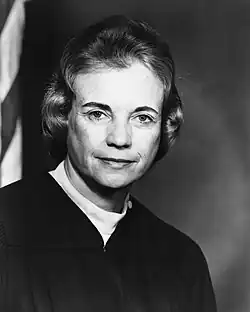Sandra Day O'Connor

| God, guns, and freedom U.S. Politics |
| Starting arguments over Thanksgiving dinner |
| Persons of interest |
|
v - t - e
|
Sandra Day O'Connor (1930–2023)[1] was the first female Supreme Court Justice. She was appointed by Ronald Reagan, and is considered by many conservatives to be a lapse of judgment on his part (Ann Coulter once called her "Reagan's biggest mistake"[2]). Despite their fears, she was moderate on everything, often providing the swing vote on an otherwise split court.
Prior to her post on the Supreme Court, she served as a judge in Arizona. She eventually retired to care for her husband, who suffered from Alzheimer's, making her one of the few Justices who retired of their own will. A more recent example is Anthony Kennedy.
She was apparently not of sound body and mind during the 2000 election because twelve years later, she admitted she regrets Bush v. Gore.[3]
Why She Was Nominated
During the 1980 Presidential Campaign, Reagan promised to nominate a woman to the Supreme Court.[4] Stu Spencer, Reagan's chief campaign strategist, has admitted that he only convinced Reagan to do so due to his lack of popularity with female voters--although he also admits that Reagan never had an issue with nominating a qualified woman to the Supreme Court.[5]
This is not to say O'Connor had no other qualifications, but it's hard to see what else Reagan saw in her other than the fact that she's a woman. Reagan even wrote in his diaries that night that "Already the flack is starting & from my own supporters."[6]:40Jerry Falwell said on the nomination that "every good Christian should be concerned" to which Barry Goldwater quipped "every good Christian should line up and kick Jerry Falwell's ass."[7] George Will, also a famous supporter of the President (even helping prep Reagan for the 1980 debate[8]), famously wrote on her:
Reagan dug about as deep as any President ever has into the state judiciary for a nominee. But, then, his sexual criterion excluded about 95% of the law school graduates of relevant age group.[9]:91
See also
- Ruth Ginsburg - the second woman on the Supreme Court.
- Sonia Sotomayor - the third woman. They are only allowed in one at a time.
- Elena Kagan
 - the fourth. Barack Obama is obviously biased against men.
- the fourth. Barack Obama is obviously biased against men. - Amy Coney Barrett
 - the fifth, the most conservative yet.
- the fifth, the most conservative yet. - Ketanji Brown Jackson
 - the sixth, first black, and most meritorious by far.
- the sixth, first black, and most meritorious by far.
References
- ↑ Linda Greenhouse, Sandra Day O’Connor, First Woman on the Supreme Court, Is Dead at 93. Archived from The New York Times, 1 December 2023.
- ↑ Reagan’s Biggest Mistake Finally Retires
- ↑ O’Connor Regrets Bush v. Gore, The New York Times
- ↑ Reagan Pledges He Would Name a Woman to the Supreme Court
- ↑ Column: The architect of Reagan’s pledge to put a woman on the Supreme Court says it was all political
- ↑ Reagan, Ronald. The Reagan Diaries, edited by Douglas Brinkley, HarperCollins (2007)
- ↑ Jerry Falwell's Paradoxical Legacy
- ↑ COLUMNIST HELPED REAGAN ON DEBATE
- ↑ Rush Limbaugh is a big fat idiot and other observations by Al Franken
You can help RationalWiki by expanding it.